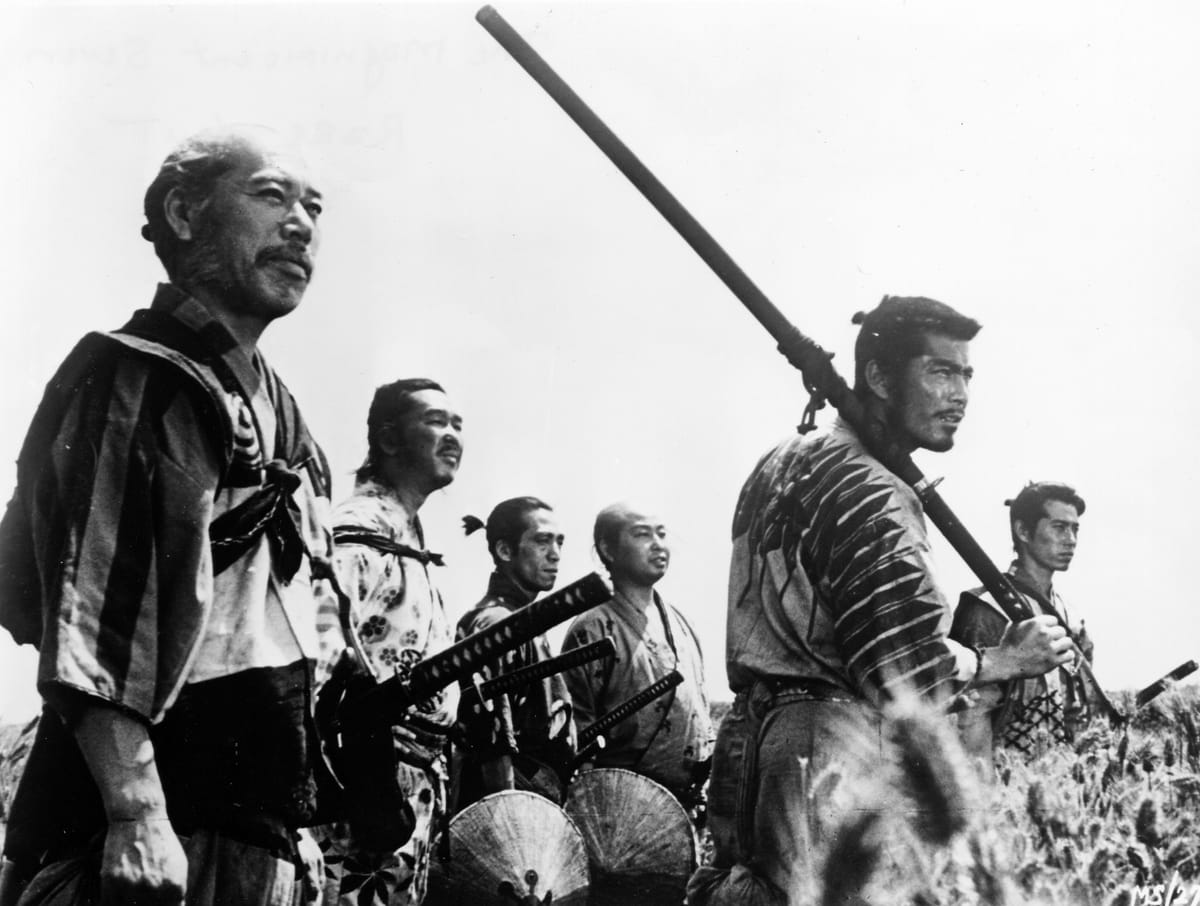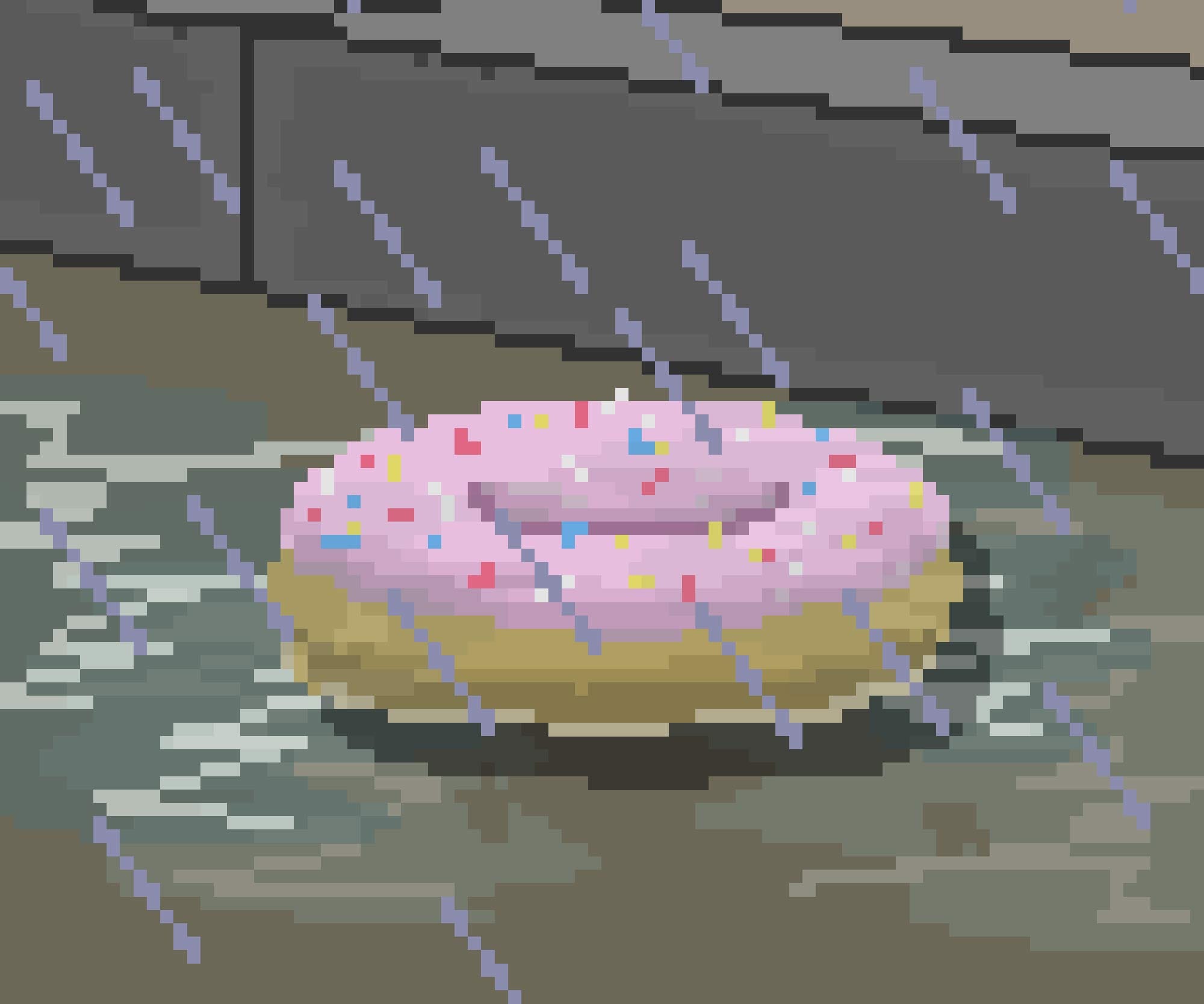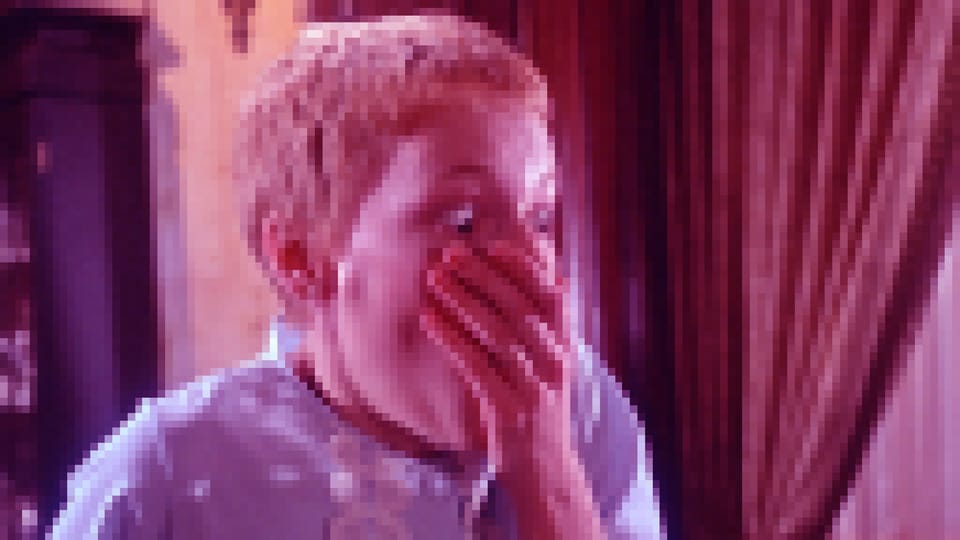Class Struggles: The Story Mechanics of Seven Samurai

Spoilers, I suppose …
What I love about Kurosawa movies is how sentimental they are, yet not condescending. They follow storylines that are full of idealism, yet often end on a sour note, knowing societal change does not come easy, if at all. Expressed in these films is the notion that greatness comes from those who break from following the rules.
Seven Samurai has three sections: the beginning build up, where the farmers enlist samurai to help them; the shaping of the village, and working out strategies for defence; and the final battle sequence, full of action. While I like the whole film, it is the first parts I love the most: the ideas and workarounds to get everyone onboard, and the exploring of a class-based culture that comes with it.
Kambei Shaves his Head
So the farmers first enlist the samurai, Kambei, a pragmatist who is willing to self-sacrifice for the greater good.
It is important to know the significance of him shaving his head. I know from listening to a podcast that the meaning here can be overlooked.
It might be more of samurai mythology than historical fact, I don’t really know, but when a samurai was defeated, instead of being killed, the victor might cut the loser’s topknot off, which would show that samurai had been defeated. The defeated samurai then had a choice of living with the terrible shame of defeat (at least until their hair grew back, I suppose) or to commit suicide.
So when Kambei shaves his head, he is showing he cares more about success, about achieving what is right, than the living with dishonour. This is important to show the altruism and cunning of Kambei, but it is also a useful device that breaks down class barriers – a concept the Seven Samurai story repeatedly returns to – which is important for the farmers to get samurai to help them.
Kambei receives no payment for his heroism and very little accolade. While Kikuchiyo poses with the thief’s body, the spectators all rush over to take a look. Kambei walks away without anyone thanking him: a true hero.
Feudalism
The farmers enlist Kambei to help them defend their farm against a bandit invasion. But Kambei doesn’t come easy. Seven Samurai is set in a world of feudalism, of rigid class distinctions, and the story works hard to contrive reasons for characters to go against their class restraints.
The farmers aim to enlist hungry, desperate samurai, but even this is shown to be no easy task. The sense of honour is so strong that few are willing to demean themselves and work only for rice. So Kambei’s altruism is an important key: he’s one of a kind.
But even Kambei initially refuses. While he gives a few reasons, it is perhaps down to the scale of the task versus the small reward of food, while the farmers are set to gain the most from the deal. But here the class-honour system plays another part. While the farmers are desperate, they are also too proud, or fearful of samurai, to reveal just how desperate they are.
Their sacrifice is revealed by another character, a hairy-faced individual, who, being an outsider, tells the situation as it is. He is one who takes relish in scorning the samurai, but also enjoys ridiculing the farmers by pointing out how are willing to eat only millet so they can afford to feed samurai. Learning of the farmers’ sacrifice convinces Kambei to help them. The farmers show they are willing to do their bit to defeat the bandits, willing to sacrifice and therefore willing to fight.
This is a good story device since people can either be liars and pretend they are worthier than they really are, or they are too ashamed to easily reveal their weaknesses. So you get a third party tell it like it is, and in this case it’s a character’s mean spiritedness that brings the reveal.
The trick of a third party intervention is used again later with Kikuchiyo, who proves important when the Samurai reach the village.
Outside of Class
Kikuchiyo is a great character who is an important addition to the story because he is outside of class, meaning strict rules do not apply to him. He is uncouth enough to speak out against samurai foolishness, but also close enough to the farmers to be able to point out their failings.
In a podcast I listened to, one of the participants said how they weren’t too keen on Kikuchiyo’s comedy sections, but I don’t think everything he does is intended to be funny. There are a few ad-libbed comedy sections, but there really aren’t that many. Instead, his acting is more an expression of his wild card nature.
His acting comes from him not being a samurai from a samurai family, but actually being born into a farming family. He is uncouth and impolite, and initially the other samurai do not accept him as one of their own. Kambei isn’t convinced he is a true samurai from their first meeting. However, despite making some costly mistakes, he is essential in allowing the story to progress.
When the samurai first arrive, the villages all hide in fear. The samurai are amazed at the insult but Kikuchiyo finds it all hilarious and isn’t surprised by the lack of welcome. While the samurai speak to the village elder, Kikuchiyo sounds the alarm and everyone runs out of their homes, believing the bandits are attacking them. He brings the samurai and farmers together into the open, then mocks the farmers for their stupidity. They show no gratitude to the samurai when they arrive, but as soon as they perceive danger, they call for their help. He breaks social protocol but in doing so, overcomes a barrier.
He is hard on farmers because he from a farming background, and has first hand experience of their selfishness, but he is hard on the samurai because he knows of their callousness. He is the one who knows the farmers have a large storage of samurai armour, taken from wounded samurai they have killed. He takes the armour to the samurai and the samurai are appalled by it, knowing how the farmers got hold of it. But Kikuchiyo is angry at the samurai for being insulted, because he knows exactly why they the farmers behave like that, because samurai show very little regard to farmers.
Again he breaks social protocol to teach the samurai a few truths.
Pride
Seven Samurai is largely a study of male pride in a patriarchal society, how it creates barriers and how the best characters are those who resist it. Kikuchiyo’s rant against the samurai is an attack on their pride. It is the pride and the mythology of honourable samurai that cause them to be so ignorant to farmers’ disdain for samurai. Farmers have no trouble killing wounded samurai because of the way samurai treat farmers.
Seven Samurai is full of moments where pride is overcome for something more noble and honourable. Kambei’s head-shaving scene is precisely that. A proud samurai would never demean himself like that.
There is a short section where the youngest samurai, Katsushirō, gives the framers money after their rice is stolen. Here, the shame of a samurai giving charity to farmers is expressed by Katsushirō refusing to look them in the eye and pretending he hadn’t just thrown some money at them. Sure, there’s still pride by him wanting to keep it a secret, but he is still willing to forsake pride and give the farmers money to keep the seven samurai project alive.
The rejection of pride is expressed acutely in the character Kyūzō, who fights only to master his skills. He enters the story when he stages a mock fight with another samurai. They fight and his competitor claims it is a draw, but Kyūzō disagrees, saying he won. This isn’t said from pride, but said because he is telling it like it is. It is his opponent’s hurt pride that makes his opponent demand a rematch with real swords, leading to his demise.
Kyūzō is a pure artist who does what needs to be done to the best of his ability. When he retrieves a rifle from the bandits, killing two in the process, he returns and does not wait for accolade. He hands over the gun and goes to the side to have a little sleep. However, he does allow himself a little bit of pride after the young Katsushirō looks at him with his glinty eyes and tells him he is great.
Seven Samurai is about dismantling the pride mythology so it can following a story of true heroes, who can only be that by being outsiders, or by stepping away from rigid class rules. The subtle message is that by conforming to the class-honour system, a samurai is merely performing their duty. As with other Kurosawa movies, like Ikiru, the true hero is the one who breaks protocol.
When characters give in to pride, it often results in failure, potential failure, or even death.
Pride is expressed with some dissent amongst the farmers of the village. Because some outlying buildings aren’t going to be protected by the samurai, the residents of those buildings stage a small rebellion. Here, Kambei uses an authoritarian rule and threatens to kill the dissenters. If the village isn’t united, the whole will fail, so the outlying buildings will be lost regardless.
Later, the village elder refuses to leave his outlying mill, and this causes his own and some of his family’s deaths, leaving a baby orphaned.
Kikuchiyo also gives in to pride by wanting to be seen to be as good as Kyūzō. Since Kyūzō retrieved a rifle from the bandits, Kikuchiyo too wants to show he can do it. He goes over to the bandits’ camp and retrieves a gun, but in doing so leaves his post and leaves the village unguarded. His act of pride leads to a number of deaths.
Bitter ending
But Seven Samurai isn’t a fairytale. There are no delusions about the few rewards of altruism. While the film shows the real heroes to be outsiders, it is important to also maintain that most people cannot be that, and heroes often go unrewarded.
The altruism of the samurai is its own reward and as the death count shows, there is nothing else beyond that. The farmers get their farm back, and all the profit that comes with it, Katsushirō is unable to be with the woman he loves, while he and other two remaining samurai get to fight another day.
Over and out for now, guys!
xxx




